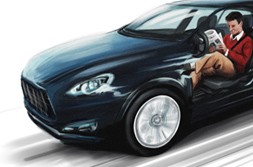Safety, Morality and the Myth of the Self-Driving Car

By Kevin Ritchart
Technological advancements are bringing society ever closer to a vehicle that drives itself, which begs the question: just because we can make a self-driving car, should we?
The Myth of the Self-Driving Car
Advocates of autonomous vehicles point out potential benefits like increased traffic efficiency, reduced pollution and fewer traffic accidents, most of which result from human error. But the idea that a driver can trust their vehicle to take them from point A to point B without incident sounds like science fiction to many.
Especially after the occupant of a 2015 Tesla Model S was killed this May when the car, which was operating in Autopilot mode, failed to avoid an 18-wheeler that turned in front of it. The vehicle’s sensors were unable to distinguish between the truck’s white side and the sky above it.
The vision systems employed by these early self-driving cars utilize low-resolution cameras to identify objects outside the car. But the technology is far from perfect, according to Carnegie Mellon University professor Ragunathan Rajkumar, who says you need at least two sensors to get high reliability.
Despite warnings that the Autopilot feature merely assists drivers and is still being tested, the occupant of the Tesla that crashed in May failed to see the truck or respond by steering away or applying the brakes manually. The National Highway Traffic Safety Administration (NHTSA) is investigating the crash, and has yet to issue a report.
The Moral Dilemma
These technologies raise another dilemma: when a car’s self-driving program must choose between protecting its passengers or the public, whose lives does it deem more valuable?
In a 2015 survey, participants opposed the idea of an automated vehicle saving the life of just one pedestrian at the expense of its passenger. But nearly three-quarters of respondents said it was more morally acceptable for a driverless car to sacrifice the life of one passenger to save 10 pedestrians.
When asked to rank their own safety and that of their family versus pedestrian safety, however, respondents’ support for pedestrians dropped precipitously.
The Road Ahead
Until self-driving cars are more than a novelty, the successes and failures of these vehicles will continue to be debated in the court of public opinion. But make no mistake, the automotive industry is gearing up for an increasingly automated future.
CLASSROOM DISCUSSION
- Would you feel safe riding in an autonomous car? Why or why not?
- What do you expect from future modes of transportation?
VOCABULARY
- Autonomous
- Autopilot
- Novelty